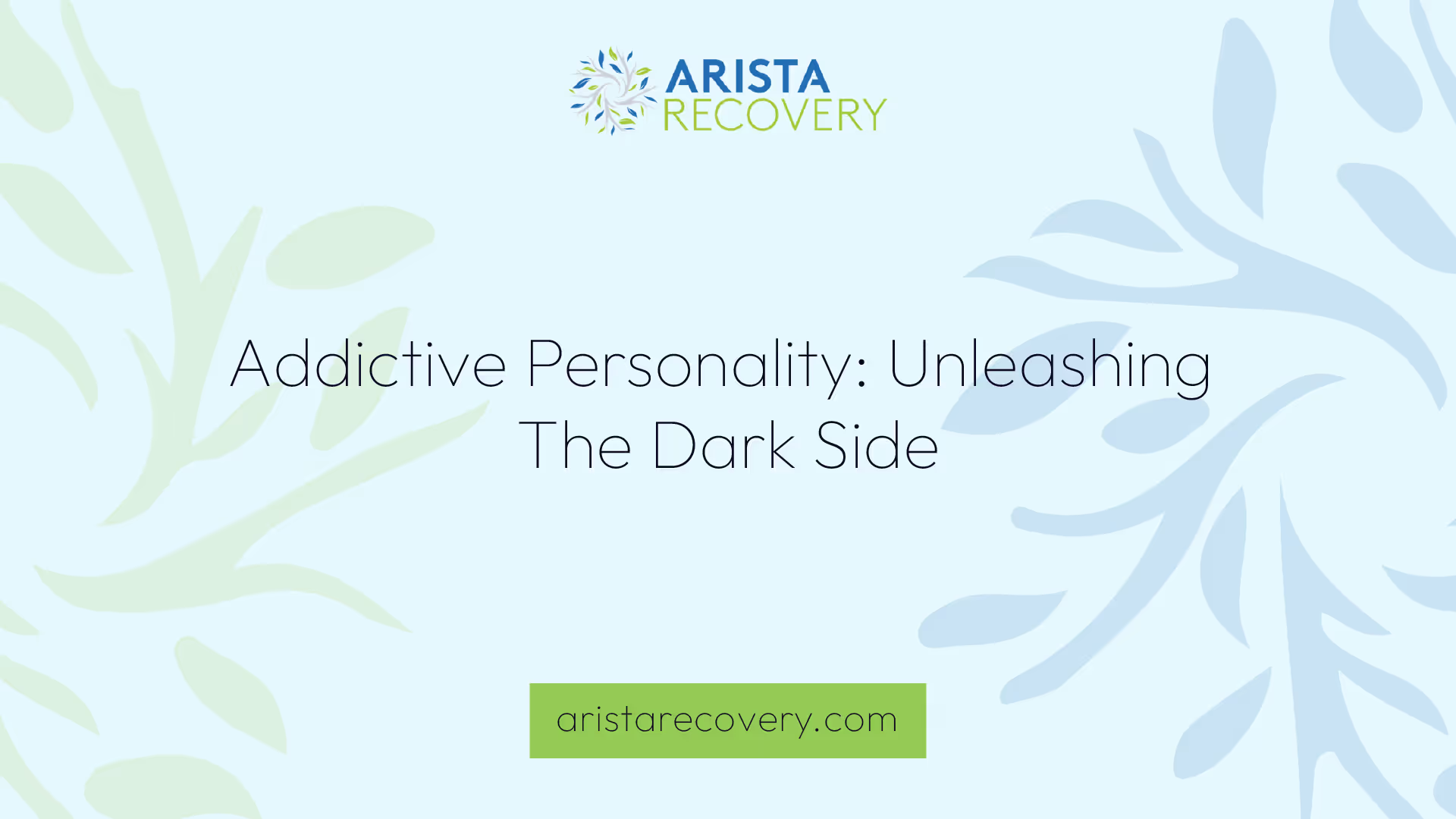
Addictive Personality: Unleashing The Dark Side
Understanding Addictive Personality
The realm of addiction is complex and multi-faceted, with one of the most intriguing aspects being the concept of an addictive personality. While it is not a diagnosable psychological disorder, understanding the traits that characterize an addictive personality can be useful in identifying potential risk factors for addiction.

Defining Addictive Personality
The term "addictive personality" refers to a set of traits or behaviors that may heighten an individual's propensity to develop addiction issues. These individuals often seek out activities that provide an immediate sense of pleasure or relief, acting as a temporary escape from negative emotions or situations [1].
It's crucial to note that not everyone possessing these traits will develop an addiction. Factors such as environment, genetics, upbringing, and personal choices significantly influence the development of addiction. In fact, some experts suggest retiring the term "addictive personality" due to a lack of cumulative evidence supporting its existence, with some claiming that characteristics associated with addictive personality do not predict addiction but may result from addiction.
Traits of Addictive Personality
People with an addictive personality may display a variety of traits, including impulsivity, sensation-seeking, unconventionality, and moodiness. They may also struggle with self-esteem and emotional regulation, often using substances or behaviors as coping mechanisms to deal with stress, anxiety, or depression. Other common traits include disorganization, heightened stress levels, low tolerance for frustration, and feelings of loneliness or alienation [1].
Understanding these traits can aid in recognizing potential risk factors for developing addiction issues and seeking appropriate support and treatment.
Factors Influencing Addiction
Addiction is a complex condition, influenced by a myriad of factors. Notably, genetics and environment play significant roles in the manifestation of addictive behaviors. Understanding these factors can provide valuable insights into the nature of addiction and inform effective treatment strategies.
Role of Genetics in Addiction
Genetic factors play a significant role in determining a predisposition for addictive behaviors. According to BetterHelp, genetics may be responsible for about half the likelihood of someone developing an addiction.
In addition, 40 to 70 percent of the population variance in the expression of addictions is explained by genetic factors. However, the influence of genes varies across different types of addictions. For instance, specific genes such as CHRNA5 are heavily linked to certain addictions, such as cigarettes.
Environmental Influences on Addiction
Environmental factors also significantly contribute to whether an individual with an addictive personality develops an addiction. Elements such as the friends you spend time with, your education, your social support, and the environment you grew up in, can all play a part in this process [3].
Exposure to sustained stress in childhood, social interactions, and familial factors have also been found to correlate with addiction susceptibility. Interestingly, individuals with particular personality traits may self-select into environments where addictive substances are more readily available.
In conclusion, both genetics and environmental factors interplay in complex ways to influence the likelihood of an individual developing an addiction. Understanding these factors is crucial in developing effective prevention and intervention strategies.
The Many Forms of Addiction
Addiction is not a monolithic entity; it manifests in different forms and can impact individuals in numerous ways. It's essential to understand that addiction is not restricted to substances alone but can also encompass various behaviors. Primarily, addiction can be categorized into two broad types: Substance Use Disorders and Behavioral Addictions.
Substance Use Disorders
Substance Use Disorders involve the abusive use of substances such as alcohol, drugs, or medications. Individuals with these disorders often continue to use these substances despite the negative consequences on their health, relationships, and other aspects of their lives.
The substances of abuse can vary widely, from legal substances like alcohol and prescription medications to illegal drugs like cocaine or heroin. In each case, the addictive personality traits can drive individuals to compulsively seek and use these substances, even if they cause harm.
Recognizing the signs of a Substance Use Disorder is crucial for initiating appropriate interventions and support. Early identification of these signs can lead to effective treatment, but recovery is an ongoing process that requires time, patience, and individualized approaches [4].
Behavioral Addictions
Contrary to common understanding, addiction is not exclusive to substances. People can become addicted to behaviors like shopping, food, video games, gambling, social media, and sex. These are known as Behavioral Addictions.
Behavioral Addictions involve a compulsion to engage in a rewarding non-substance-related behavior, sometimes called a natural reward, despite any negative consequences to the individual's physical, mental, social, or economic well-being. Notably, individuals with addictive personalities often switch from one addiction to another, exhibiting impulsive behaviors such as excessive caffeine consumption, Internet use, food consumption, television watching, or running. Traits like extraversion, self-monitoring, and loneliness are commonly found in those who suffer from addiction.
An addictive personality may manifest as an individual who is repeatedly drawn to toxic relationships.
Recognizing these signs and seeking help can lead to effective treatment. However, recovery is an ongoing process that requires time, patience, and individualized approaches [4].
By understanding the many forms of addiction, individuals, families, and healthcare providers can better identify the signs and seek appropriate interventions.
Recognizing Signs of Addiction
Recognizing the signs of addiction is a critical first step in the journey towards recovery. Addiction, a disease that affects a person's brain and behaviors, can manifest in a variety of ways and to varying degrees. Understanding what to look for can help individuals identify when they or a loved one might be struggling with addiction.
Identifying Harmful Behaviors
Addictions can be categorized into two major types: substance misuse or overuse, such as drugs or alcohol, and excessive engagement in behaviors regardless of the costs, such as shopping, screen time, gambling, sex, pornography, or food [4]. While the signs of addiction can vary greatly among individuals, there are common threads that can indicate a potential issue.
For instance, experiencing a euphoric feeling when engaging in a specific behavior, such as shopping, could be a sign of potential addictive behavior. Other warning signs include the need to continuously engage in the behavior to maintain a certain mood, or when the behavior starts to impact one's career, personal relationships, or financial situation. Unfortunately, individuals with an addiction are often the last to acknowledge they have a problem or have lost control over their behavior [4].
Impact on Health and Relationships
Addiction can have extensive effects on an individual's health, relationships, careers, and other facets of their life. These impacts can range from physical health issues related to substance use, to financial strains, to damaged relationships due to obsessive behaviors.
Recognizing these signs and seeking help is crucial, as addiction and its related problems can be effectively treated. However, recovery is an ongoing process that requires time, patience, and individualized approaches. Unfortunately, there remains a stigma around addiction that may deter individuals from seeking the help they need. It is vital to be open and transparent with healthcare professionals if you or someone you know is struggling with addiction.
Understanding the signs of addiction, and the impact on health and relationships, can provide crucial insights for those grappling with addictive personality traits. With this knowledge, individuals can seek the necessary help and support to embark on a path to recovery.
Addiction and Mental Health
Delving into the complexities of addiction, it's important to explore its relationship with mental health. Certain mental health conditions, such as anxiety, can potentially exacerbate addictive behaviors, particularly in individuals with addictive personalities.
Link Between Anxiety and Addiction
There's a clear link between anxiety and addiction. Many people suffering from anxiety disorders may turn to substances as a form of self-medication. A person with untreated anxiety, for example, may be more likely to use substances to relax and alleviate their symptoms.
This is particularly concerning for individuals with an addictive personality, who are already predisposed to addictive behaviors. These individuals typically act on impulses and have trouble dealing with delayed gratification. They may also exhibit low self-esteem, impulsivity, low tolerance for stress, and frequent mood swings that can lead to depression [2].
Such individuals often struggle with impulsive behaviors, difficulty managing emotions, and have a high likelihood of engaging in dangerous activities due to their need for stimulation.
Coping Mechanisms and Addiction
When it comes to dealing with stress, anxiety, or depression, some individuals with addictive personalities may resort to substances or behaviors as coping mechanisms. This can, unfortunately, lead to a cycle of addiction, as the person becomes increasingly dependent on these substances or behaviors for emotional regulation.
Moreover, individuals with low self-esteem or a history of traumatic experiences may also be more likely to develop addictive behaviors as a way of coping. These coping mechanisms often involve turning to addiction as a way to control their personality traits.
Therefore, it's crucial to recognize the intertwined relationship between mental health and addiction. By addressing mental health issues like anxiety and implementing healthier coping mechanisms, it's possible to reduce the risk of developing an addiction, particularly in individuals with an addictive personality.
Navigating Addiction Recovery
The journey towards overcoming addiction is a complex process, especially for individuals grappling with an addictive personality. This section aims to shed light on the vital steps involved in addiction recovery, including the importance of early intervention and the implementation of personalized treatment plans.
Importance of Early Intervention
Recognizing the signs of addiction and seeking help early is crucial, as addiction and its related problems can be effectively treated. However, recovery is an ongoing process that demands time, patience, and a nuanced approach.
An early intervention can significantly enhance the prospects of recovery. It allows individuals to gain a deeper understanding of the root causes and triggers of addictive behaviors, which is crucial in providing effective support and assistance. Without professional help and self-awareness, the cycle of toxic relationships, often seen in individuals with addictive personalities, can be challenging to break.
Personalized Treatment Plans
Recovery from addiction is not a one-size-fits-all process. It requires a tailored treatment plan designed to address the individual's unique needs and circumstances. Seeking professional help and support tailored to individual needs is crucial for effectively addressing addiction and promoting long-term recovery [7].
A personalized treatment plan might encompass various therapeutic interventions, including cognitive-behavioral therapy, medication, group therapy, and lifestyle modifications. It’s vital for individuals to be open and transparent with healthcare professionals about their struggles, as this enables them to develop a more effective and individualized treatment plan.
Navigating through addiction recovery is a long-term commitment that requires patience, resilience, and dedicated support. While the journey can be challenging, the rewards of overcoming addiction and leading a healthier, more fulfilling life are immeasurable.
References
[1]: https://americanaddictioncenters.org/the-addiction-cycle/traits-of-an-addictive-personality
[2]: https://en.wikipedia.org/wiki/Addictive_personality
[3]: https://www.betterhelp.com/advice/personality-disorders/13-signs-you-might-have-an-addictive-personality/
[4]: https://www.mayoclinichealthsystem.org/hometown-health/speaking-of-health/do-you-have-addictive-personality-traits
[5]: https://www.webmd.com/sex-relationships/what-is-addictive-relationship
[6]: https://firststepbh.com/blog/what-to-expect-when-dating-someone-with-an-addictive-personality/
[7]: https://diamondrehabthailand.com/what-is-addictive-personality/
When mental health challenges and addiction intersect, it can feel isolating. At Arista, we offer compassionate, evidence-based, and trauma-informed care to help you heal, grow, and move forward.
You’re not alone in this.
When mental health challenges and addiction intersect, it can feel isolating. At Arista, we offer compassionate, evidence-based, and trauma-informed care to help you heal, grow, and move forward.
Support that moves with you.
You’ve taken a brave first step. At Arista Recovery, we’re here to help you continue with best-in-class care designed for long-term healing and support.
.webp)






